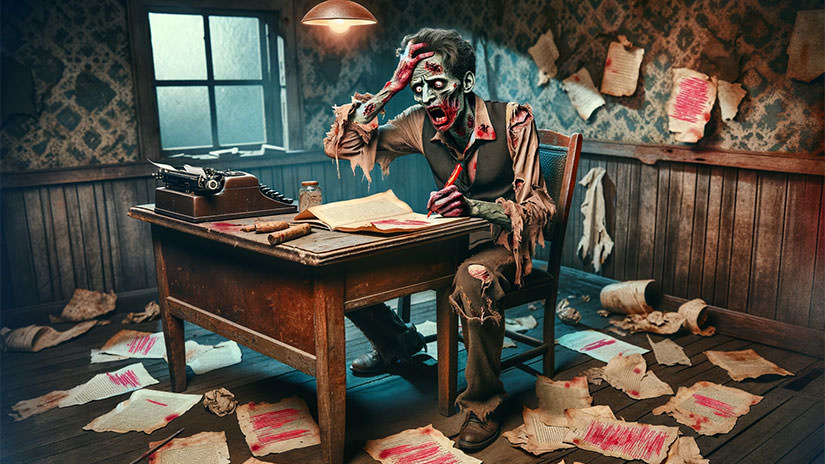
In my pursuit of completing my manuscript and stepping into the realm of querying agents and publishers, I had placed Thanksgiving as the pivotal marker. However, my progress has hit a few snags along the way. Work, as it so often does, has emerged as an unexpected obstacle. In particular, one project for a website client, a client whose importance I deeply acknowledge, has surfaced as a complex challenge, demanding a significant portion of my time recently.
Nevertheless, the most substantial hindrance has been my own line-editing process. While professional line editors can efficiently breeze through an 89,000-word novel like mine in a mere 1-2 weeks, my reality diverges. I edit in the evenings and during the intervals between my classes, resulting in a slower and sometimes admittedly tedious process. At this juncture, I've managed to complete only 8.5 of the 49 chapters, encompassing both the prelude and epilogue, over the last month.
Now, you might question, "Blake, why not harness the power of software to expedite the editing journey?" It's a valid inquiry, but line editing doesn't align with software's capabilities, nor do I desire it to. Copy-editing, such as the detection of basic grammar and spelling errors or the identification of overused phrases, fits seamlessly with software tools like ProWritingAid or Grammarly. However, line-editing delves into deeper territory. It entails the scrutiny of word choice, the flow of sentences, the necessity of descriptions, the management of pacing, and much more. This level of detail remains a realm where even the most advanced AI struggles to make an impact. It requires the delicate perception of the human eye and mind. Here, an author can take a mundane sentence and elevate it into something exciting and dynamic. It's where a simple synonym swap can completely transform the mood and atmosphere of a passage. These nuanced refinements, I believe, elevate a book from mediocrity to excellence.
In my current approach, I've undertaken an unconventional strategy—I've printed out the entire novel, and here's the twist—I'm reading it backwards, one paragraph at a time, sentence by sentence. Not a single sentence is permitted to remain untouched and unedited. I'm shortening sentences, consolidating them, deleting those that are superfluous, and substituting weak adjectives, nouns, and verbs with more robust counterparts. Simultaneously, I'm on a relentless mission to eliminate adverbs (a somewhat peculiar yet effective rule in writing). Following each edit, I revisit sentences, paragraphs, and passages repeatedly to ensure they encapsulate the desired "feel." Consequently, my pages are now stained with red ink from this uncompromising self-assessment.
You might ponder the rationale behind reading the manuscript backwards. It's an excellent question. I possess a profound love for my story, and that love serves as the very impetus for my writing journey—to craft a narrative that I myself would relish reading. It's far too easy to tumble into the trap of reading my story purely for enjoyment, turning page after page without making necessary edits. This is a pitfall I am determined to evade. Reading the story backward forces me to resist getting swept away by the narrative's flow. It provides a unique vantage point from which I can meticulously scrutinize each paragraph, sentence, and word in isolation.
Now, why not consider hiring a line editor, you might ask? Many authors choose this path. However, it often entails an average investment of $5,000, a sum I am not presently prepared to allocate. Consequently, I have embraced self-line editing. Surprisingly, I've found myself relishing the process despite its tedium and challenges. It draws me closer to my story, immerses me deeper into the world I've crafted. After each edit, I bear witness to the story's transformation, a gradual metamorphosis that I truly cherish. It may be a slower process than molasses in January, but it's a journey I am wholeheartedly committed to, one that I believe will ultimately yield a richer and more refined narrative.
In three weeks, my family and I are set to board a plane bound for 'Merica to celebrate the holidays. It's a long-overdue vacation (holiday for you Brits) that's been deferred for over a year and a half. During the quiet hours of the day when my family is deeply ensconced in dreams of sugarplums, I'll be wide awake, wielding my red-inked sword to both dismantle and rebuild my story. I hope this break will provide the respite I need to complete my editing journey, a little New Year's present to myself.
Therefore, I must extend my apologies to Wes, for I won't have the book ready for you by Christmas when I visit Ohio. Nevertheless, I remain steadfast in my belief that the meticulous editing I am undertaking will genuinely transform Who Put Bella in the Wych Elm? into a book that readers will treasure.
Thank you for your unwavering patience with
me. Until our next encounter, folks.
Post Comments
Wes
Holly Folk
Recent Posts
Chapter 62: What's hurting Indie-publishing? Chapter 61: A Sneak Peek into 'Who Put Bella in the Wych Elm?' Chapter 60: Revealing the Cover of Who Put Bella in the Wych Elm? Chapter 59: ADHD + Self-Publishing = Creating a Publishing Company Chapter 58: Ooooooo, the new cover! Chapter 57: Who is H.P. Lovecraft? Chapter 56: I've been quiet ... because ... Chapter 55: Haunted Objects-Do They Exist? Chapter 54: Urban Legends Unpacked - Examining the Truth Behind Local Ghost Stories Chapter 53: The Dark Side of History - Researching Real-Life Horrors for InspirationArchives
August 2025January 2025
December 2024
September 2024
August 2024
July 2024
June 2024
May 2024
April 2024
March 2024
February 2024
January 2024
December 2023
November 2023
October 2023
September 2023
August 2023
July 2023